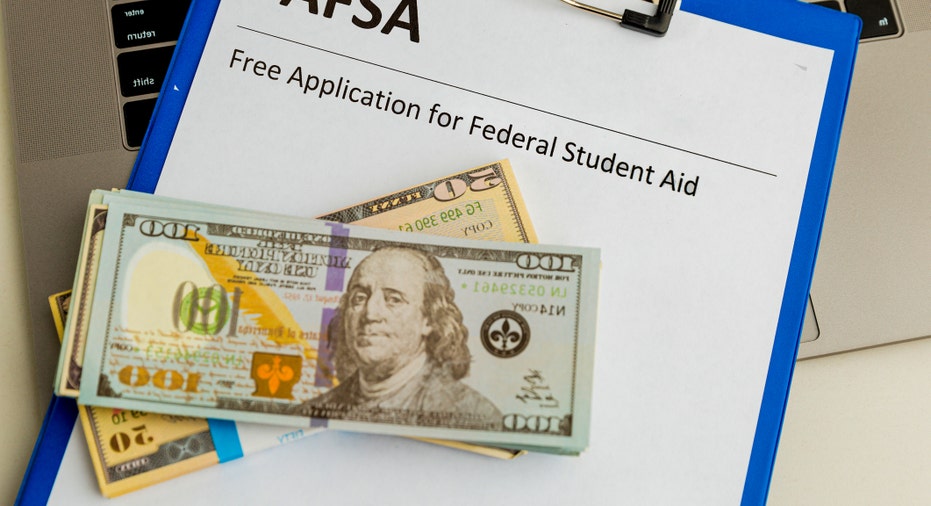Do you qualify for FAFSA?

A FAFSA opens up the door to federal student aid, work-study programs, and many scholarships. But not everyone is eligible to complete one. (iStock)
The Free Application for Federal Student Aid (FAFSA) is a simple form you must complete if you want to be eligible for federal student aid. This includes not just Direct Loans, but also access to work-study funds or federal grants. And many colleges and state loan programs also use the FAFSA to determine if you're eligible for financial assistance.
You can complete your FAFSA online at the Department of Education's website and file it as soon as October 1 for the upcoming academic year, although June 30 is the deadline. It's a good idea to apply as soon as possible as some types of aid are limited. You'll want to fill out a FAFSA for each year you plan to attend school and will need some basic information to do so including details about your parents' finances unless you're a grad student or independent undergrad.
While filling out the FAFSA is important, not everyone is eligible to do so. To avoid wasting your time, make sure you review the basic rules for eligibility before you get started.
What are the FAFSA requirements?
Certain types of federal student aid, including Direct Subsidized Loans and federal work-study programs, require you to demonstrate financial need. However, some types of loans aren't need-based so you may want to complete the FAFSA even if you or your family have a higher income.
There are certain minimum requirements you have to fulfill to complete your FAFSA:
- You must be a U.S. citizen or an eligible non-citizen. Eligible non-citizens include permanent residents with green cards; students who have a T-1 Visa or whose parents do; immigrants with arrival-departure records who have been granted asylum or who are considered refugees; or people with battered-immigrant status.
- You'll need to provide a Social Security number when applying.
- You must have a high school diploma, a GED, or have completed high school in an approved home school setting.
- You must be enrolled in an eligible degree or certification program or must have been accepted to an eligible program. If you're already attending your program, you must be making satisfactory academic progress as defined by your school.
- You must be registered for the selective service if you're a male between the ages of 18 and 25 and are not on active military duty.
Students who have been granted Deferred Action for Childhood Arrivals (DACA) aren't eligible to receive federal aid but in some cases may wish to complete a FAFSA to qualify for state aid or financial assistance programs offered by colleges and universities. The Department of Education recommends talking with your school's financial aid office or a college counselor if you've been granted DACA status and want help funding your degree.
How can you lose your federal financial aid?
In some circumstances, you may not be eligible for federal student aid even if you meet the basic requirements to complete a FAFSA. This could happen under the following circumstances:
- You default on a federal student loan after disbursement and you don't pay it in full or rehabilitate it.
- You fail to make satisfactory academic progress. Depending on your school, this could mean maintaining a certain GPA or taking a certain number of credits each academic term.
- You're incarcerated or convicted of a drug offense while receiving student aid. However, you can regain eligibility by fulfilling certain requirements including completing an approved drug rehabilitation program.
- Your immigration status changes. If you're no longer an eligible immigrant, you won't be entitled to receive aid unless your status is restored or you become a permanent resident or citizen.
If you no longer have financial need or you change majors while receiving aid earmarked for students earning a specific degree (such as TEACH grants), you may lose eligibility for specific types of federal aid -- but should still complete the FAFSA as you could still be entitled to other assistance.
FINANCIAL AID AWARD LETTERS: WHAT TO KNOW AND HOW TO COMPARE
What if you aren't eligible for federal student aid?
If you're not eligible for loans or grants from the federal government to help you pay for school, there may be other sources of help you can qualify for. You should:
- Talk with the financial aid office at your college or university to determine if you're eligible for financial help from the school.
- Check with your state's Department of Education to find out about state-based loans and grants.
- Check with professional organizations if you hope to major in a particular field to see what aid is available.
- Research scholarships and grants from private organizations. Many churches, unions, non-profits, and for-profit companies offer various types of financial help for students.
- Explore taking out private student loans. While they often have a higher interest rate and less borrower protections than federal loans, they can make going to school possible if you can't qualify for other help.
Complete your FAFSA as soon as possible if you're eligible
Waiting to complete your FAFSA, or not completing one at all, could be a big mistake if you're hoping to receive financial aid. No matter how much money you or your family have, fill out this form for each year you'll be attending school. It's free and you may be surprised at the assistance you can qualify for to cover part of the costs of getting your education.